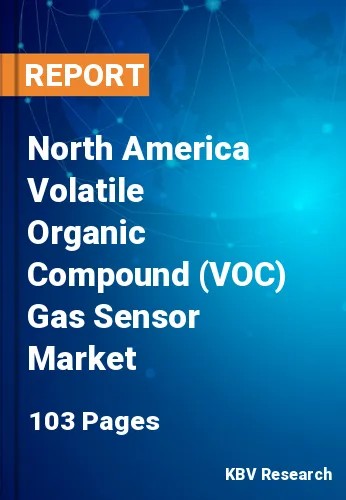The North America Volatile Organic Compound (VOC) Gas Sensor Market would witness market growth of 4.7% CAGR during the forecast period (2023-2029).
The market is expected to expand significantly due to the rising use of VOC gas sensors to detect and measure the presence of dangerous VOCs in the air. Volatile organic compounds come from various places, such as the exhaust fumes created by the transportation and burning of fuel, as well as releases from items like furniture, building materials, and ornamental materials, among others. The market is also being driven by the increasing use of volatile organic compounds gas sensors in indoor air monitoring equipment due to their remarkable qualities, such as their capacity to offer precise sensing results, tiny and portable design, and compact size.
The careful monitoring of these and other potentially dangerous volatile organic compound gases, such as toluene, ethylene, xylene, benzene, and formaldehyde, requires the right gas detection equipment or sensor. The Health & Safety Executive's EH40/2005 "Workplace exposure limits" and the Occupational Safety and Health Administration OSHA are just two of the agencies that define regionally specific regulatory limits for VOC gas emissions and exposure. Many human activities, such as industry, printing, and agriculture, create and release harmful environmental VOC emissions.
The national VOC emission standard for commercial products and consumers is 40 CFR 59, and the Environmental Protection Agency (EPA) administers it at the federal level. In addition, the Volatile Organic Compound Concentration Limits for Certain Products Regulations, published in Canada in 2022, require importers and manufacturers to abide by concentration limits for VOCs in around 64 product categories. Additionally, to ensure utility firms operate as efficiently as possible, the region's governments have emphasized the regulatory framework and necessary/mandated infrastructure. The need for VOC gas sensors has thus increased across various end-use sectors. Therefore, the demand is increasing, propagating the market's growth.
The US market dominated the North America Volatile Organic Compound (VOC) Gas Sensor Market by Country in 2022 and would continue to be a dominant market till 2029; thereby, achieving a market value of $46,867.4 Thousands by 2029. The Canada market is showcasing a CAGR of 7% during (2023 - 2029). Additionally, The Mexico market would register a CAGR of 6.1% during (2023 - 2029).
Based on Type, the market is segmented into Multiple Gas Detection Sensor and Single Gas Detection Sensor. Based on Application, the market is segmented into Oil & Gas, Agriculture, Manufacturing, Chemical Industry, Automotive, Metals & Mining, Food & Beverages, and Others. Based on Technology, the market is segmented into Metal-oxide Semiconductor, Infrared-based Detection, Photo-Ionization Detector (PID) and Others. Based on countries, the market is segmented into U.S., Mexico, Canada, and Rest of North America.
Free Valuable Insights: The Worldwide Volatile Organic Compound (VOC) Gas Sensor Market is Projected to reach USD 216.1 Million by 2029, at a CAGR of 5.3%
The market research report covers the analysis of key stake holders of the market. Key companies profiled in the report include Honeywell International, Inc., Siemens AG, Alphasense, Inc., Bosch Sensortec GmbH (Robert Bosch GmbH), ABB Ltd, Renesas Electronics Corporation, Sensirion AG, Interlink Electronics, Inc. (KWJ Engineering, Inc.), SGX Sensortech (Amphenol Corporation), and ION Science Ltd.
By Type
By Application
By Technology
By Country
Our team of dedicated experts can provide you with attractive expansion opportunities for your business.

